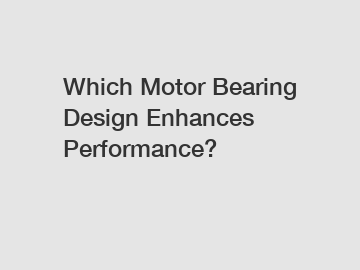Which Motor Bearing Design Enhances Performance?
Which Motor Bearing Design Enhances Performance?
When it comes to motor design, every engineer strives to enhance performance and efficiency. Among the various components crucial to motor operation, bearing design plays a vital role. A well-designed bearing system can significantly impact a motor's overall performance and longevity. In this article, we will explore different motor bearing designs and discuss their potential benefits in enhancing performance.
1. Deep Groove Ball Bearings:

Deep groove ball bearings are the most common type of bearings used in motors. They can handle both radial and axial loads, making them versatile for various motor applications. The symmetrical design of these bearings allows for high-speed operations and smooth rotation. Deep groove ball bearings offer low friction, reducing energy losses and improving motor efficiency. These bearings also have minimal noise and vibration levels, ensuring a quieter motor operation.
2. Angular Contact Ball Bearings:
Angular contact ball bearings are ideal for motor applications that require higher axial loads and greater rigidity. These bearings have a contact angle, enabling them to handle thrust loads in combination with radial loads. By distributing loads effectively, angular contact ball bearings can enhance motor performance by reducing stress on other motor components. Additionally, their precision and high-speed capabilities make them suitable for demanding motor applications that involve fast and precise movements.
3. Cylindrical Roller Bearings:
Cylindrical roller bearings are commonly used in electric motors with heavy radial loads. They provide excellent radial support and have high load-carrying capacity. Their design allows for better alignment between the rolling elements and the raceways, reducing friction and optimizing motor efficiency. Furthermore, cylindrical roller bearings offer enhanced performance in applications that involve high-speed operations and frequent start-stop cycles.
4. Tapered Roller Bearings:
Tapered roller bearings are designed to handle both radial and axial loads. These bearings have tapered raceways that allow for efficient distribution of loads. Tapered roller bearings are commonly used in motors that require high radial and thrust load capacities, such as those found in heavy machinery and vehicles. By accommodating axial loads, tapered roller bearings can minimize stress and improve motor performance in applications with varying load conditions.
In conclusion, choosing the right bearing design is essential for enhancing motor performance. Deep groove ball bearings offer versatile and efficient operation, while angular contact ball bearings provide increased rigidity and load-handling capabilities. Cylindrical roller bearings excel in heavy radial load applications, and tapered roller bearings are ideal for combined radial and axial load scenarios. Each bearing design comes with its unique advantages, and the choice depends on specific motor requirements. By carefully selecting the appropriate bearing, engineers can optimize motor performance, efficiency, and longevity, ultimately leading to improved overall system performance. So, which motor bearing design enhances performance? The answer lies in understanding the motor's operating conditions and choosing the bearing design that best suits its requirements.
If you want to learn more, please visit our website Mounting of the Tapered Thrust Bearing, electric motor bearings wholesale, trolley wheels bearings wholesale.


